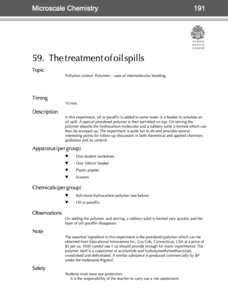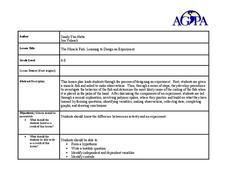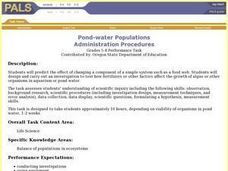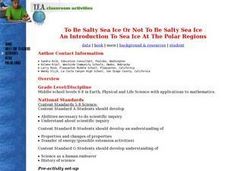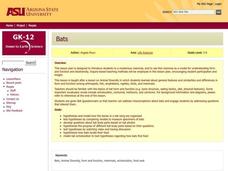Royal Society of Chemistry
The Treatment of Oil Spills—Microscale Chemistry
When oil spills happen, how is the oil cleaned up? Pupils of polymer science discover an amazing substance that turns oil into a solid during a microscale experiment. Individuals observe oil or paraffin before and after addition of the...
Curated OER
The Miracle Fish: Learning to Design an Experiment
Learners develop procedures to explore the behavior of fish. In this scientific experiment lesson students from a hypothesis, write a question, identify different variables and controls in their experiment.
Curated OER
Density and Buoyancy Experimental Design
Students must plan, design, and conduct an experiment that answers the scientific question: "Come up with a question that addresses the factors (variables) of the water and its effect on whether an object floats or sinks."
Curated OER
Building a Pill Bug Palace
Students make "pets" of isopods (potato bugs) to determine their preferred environment and food sources. They record their results on a bar graph and in a scientific report.
Curated OER
Pond-water Populations
Students design and conduct and experiment on algae, for a two week period, to answer the question "In your investigation, how does changing one factor affect the growth of organisms?"
Curated OER
Breaking the Food Chain
Students investigate the food chain. They brainstorm questions about the human food chain and explain what would happen to living things in the food chain if organisms or resources were removed. They role-play situations in which the...
Curated OER
Food Forensics: A Case of Mistaken Identity
High schoolers develop an experiment to test a hypothesis. They use their knowledge of antigen-antibody specificity to develop a hypothesis. Students articulate that the antibody-antigen specificity is one part of the immune system. They...
Curated OER
Heating Crystals
Students examine the effects of heating on various crystals. They answer questions in the observation category which assess their ability to use a variety of senses to observe data in a certain way- a scientific way.
Curated OER
Survival
Middle schoolers determine the best material from which to make a jacket to keep the body warm in a cold, dry, windy climate. This task assesses the student's ability to perform an entire investigation. In this question the independent...
Curated OER
Classification of Animals
Sixth graders examine two-way classification systems using four mutually exclusive groups and two dimensions simultaneously. They then are given a set of plastic animals, asked to create a two-way classification system, then asked to...
Curated OER
Let the Sunshine in
Students collect and analyze data to study wavelengths of visible light. They cover Styrofoam cups with three different colors of sun filtering products and shine a lamp directly on the cups. They determine the most effective filtering...
Curated OER
Heating Crystals
Learners examine the effects of heating on various crystals. They formulate and revise scientific explanations and models using logic and evidence. Students work individually during this experiment.
Curated OER
Tadpoles
Young scholars examine tadpoles at various stages of development. They make careful scientific observations and compare the changes that occur at five different phases of a frog's life.
Curated OER
How Do The Colors of Light Mix?
Students investigate the mixing of light. They form a hypotheses to reason why color changes occur and they write conclusions and ask new questions arising from the investigation. Students identify the primary and complementary colors of...
Curated OER
Snell's Law
Students determine whether the index of refraction of sample of Corn Syrup meets Federal standards. This task assess students' abilities to explain the procedures for investigation, plan for recording and organizing observations and...
Curated OER
Density of a Sinker
Eighth graders determine the density of a sinker by first finding the mass and then the volume using a graduated cylinder. Students must write the procedure they use to find the volume of the sinker then apply their data to follow-up...
Curated OER
Window Gardens
High schoolers use a plastic sandwich bag containing a damp paper towel taped to a window as a model system to observe the germination and early growth of radish seeds. They are challenged to pose a question about seed germination and...
Curated OER
To Be Salty Sea Ice Or Not
Students explore what type of solutions freeze. They design their own experiments to compare how fresh water and salt water freezes. In addition, they write their observations in a journal and complete analysis questions.
Curated OER
Maintaining Plant Genebanks
Students examine the use, costs, and the need for plant gene banks. The rationale for gaining ownership over scientific information and the implications of the developing nations' reliance on biotechnology is explored in this...
Curated OER
Bats
Students model how the bones in a bat wing are organized. They develop questions about bat body parts based on photographs. They hypothesize how bats locate their food.
Curated OER
Phases of Matter
Eighth graders practice using correct vocabulary and apply content knowledge related to phases of matter when answering questions about situations or observations from everyday life.
Curated OER
Biomedical Imaging
Students use guided questions and research to compare two biomedical imaging methods. they effectively present their findings to the class. Students use new technical knowledge to summarize and compare new techniques with those they...
Curated OER
The Science of Weather: Hurricanes
Students use this USA today activity to learn about hurricane season. In this hurricane lesson, students study the map of the earth and hurricane science. Students complete discuss questions. Students draw a map of the United States and...
Curated OER
Engineering
Students examine how Shell uses engineering. In this engineering principles lesson students visit a web-pages, answer questions, and examine the ways that engineers go about exploring different ideas.


